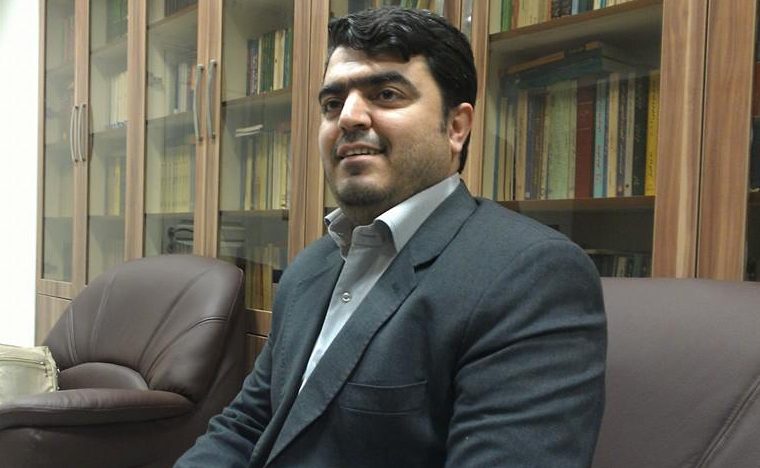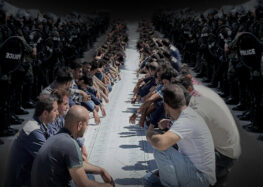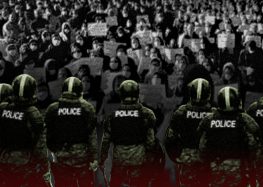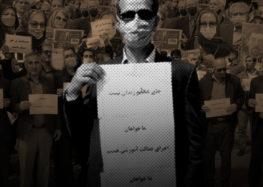Teachers’ Rights Advocate Writes Scathing Letter From Prison on Revolutionary Iran’s Failed Promises

Esmail Abdi Warns Judiciary of the Consequences of Its “Illegal Rulings” Ahead of Hunger Strike
Prominent teachers’ rights advocate Esmail Abdi has written a letter from Evin Prison strongly criticizing Iranian officials’ for their failure to uphold the promises of the country’s 1979 revolution.
Noting that he will begin a hunger strike on April 18, 2018, Abdi also blasted the Iranian Judiciary’s “arbitrary and illegal rulings” and “widespread violation of the rights of teachers and workers in Iran.”
The 44-year-old high school teacher and former secretary general of the Iranian Teachers’ Trade Association has been serving a six-year prison sentence since being arrested by the Intelligence Ministry in 2016 for the charges of “propaganda against the state” and “collusion against national security.”
He is demanding to be tried in a public court with a jury and to be granted furlough.
Furlough, temporary leave typically granted to prisoners in Iran for a variety of familial, holiday, and medical reasons, is routinely denied to political prisoners as a form of additional punishment.
Abdi’s March 2018 letter addressed international human, education and labor rights organizations. Following is the full text of the letter obtained by the Center for Human Rights in Iran (CHRI):
This is the 40th Nowruz [Iranian New Year’s day, March 21, 2018] since the revolution; a revolution that took place in 1979 with the promise of ending dictatorship, establishing democracy, implementing transparency and preventing the accumulation of wealth in the hands of a particular class; a revolution that the clerics and some political groups said would be a harbinger of peace and freedom and put an end to poverty and discrimination, where people would have access to free water and electricity and enjoy such rights as freedom of thought and expression, free and equal education, with the right to form organizations and unions, hold protests and strikes, assemble and rally and be equal against the law.
But these aspirations did not amount to anything besides slogans. The blessings of the revolution benefitted not the poor but rather the rich, the powerful and tricksters. The groups that came to power used the state media to promise a better and more dignified life. They took advantage of the people’s beliefs and values to attract votes while amassing wealth from the nation’s treasury and now we see competing factions trying to expose each other.
During these four decades, most countries in the world have made education a priority. But in Iran the largest ministry in the country [Education Ministry], with more than a million teachers and millions of students, has seen continuous budget deficits. The distribution of welfare and education facilities have always fallen short for the poor and benefitted the wealthy. At the same time, most schools are worn out and teachers and students face many dangers. Retired and employed teachers, including freelance, part-time and pre-school teachers as well as toiling workers, are grappling with how to survive under the poverty line while every few days they hear news about the plunder of funds they worked hard for, such as the recent embezzlement of 13 billion rials (approximately $3.4 million USD) from the teachers’ pension fund.
Since the nuclear deal [July 2015], the officials of the Islamic Republic have boasted to the world about adhering to the Universal Declaration of Human Rights and other international conventions and yet sections of the ruling establishment have no respect for the Constitution they themselves authored. They are trying to control the conflicts at various levels of society and suppress critics by creating a security climate for the few existing independent teachers’ and workers’ organizations and crush peaceful assemblies and frame trade union activists with such threadbare charges as “acting against national security” in show trials without the presence of a jury. Unfortunately, despite the monitoring of the situation of workers and teachers in Iran by human rights organizations and international bodies such as Amnesty International, the International Labor Organization and Education International, the suppression of trade unionists has even spread to schools and factories.
Some of the people in charge are putting pressure on the judicial system and interfering with indictments and sentences, rejecting Supreme Court reviews, and preventing conditional leave for prisoners. Acting above the law, unfortunately, they are ruling over judges, prosecutors and other judicial authorities.
As a teacher and board member of the legitimate Iranian Teachers’ Trade Association in Tehran, while declaring my solidarity will all teachers and workers of the world, I warn the judiciary about the ominous consequences of its arbitrary and illegal rulings, and I will go on a hunger strike on Tuesday April 17, 2018, to protest against the widespread violation of the rights of teachers and workers in Iran and demand a public trial and the right to go on furlough and medical leave in accordance with Article 520 [of the Criminal Procedures Regulations], which is currently being illegally blocked. Obviously, the judicial branch will be responsible for the consequences of this hunger strike.
Esmail Abdi
Ward 4, Evin Prison
March 2018
Copies:
Education International
International Labor Organization
Amnesty International






